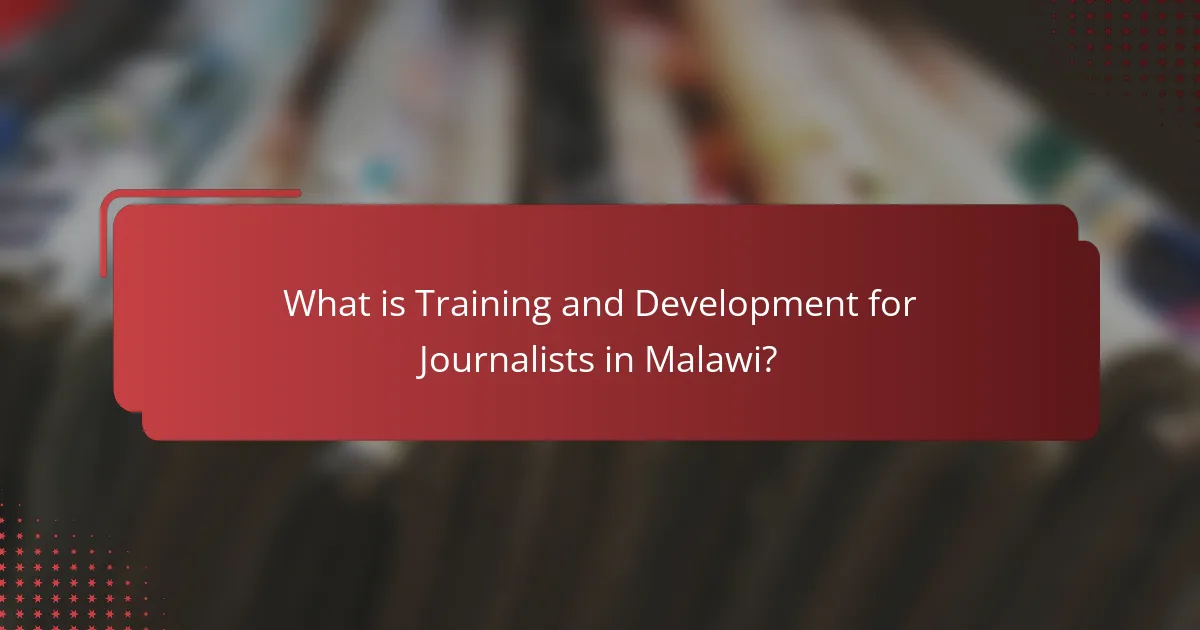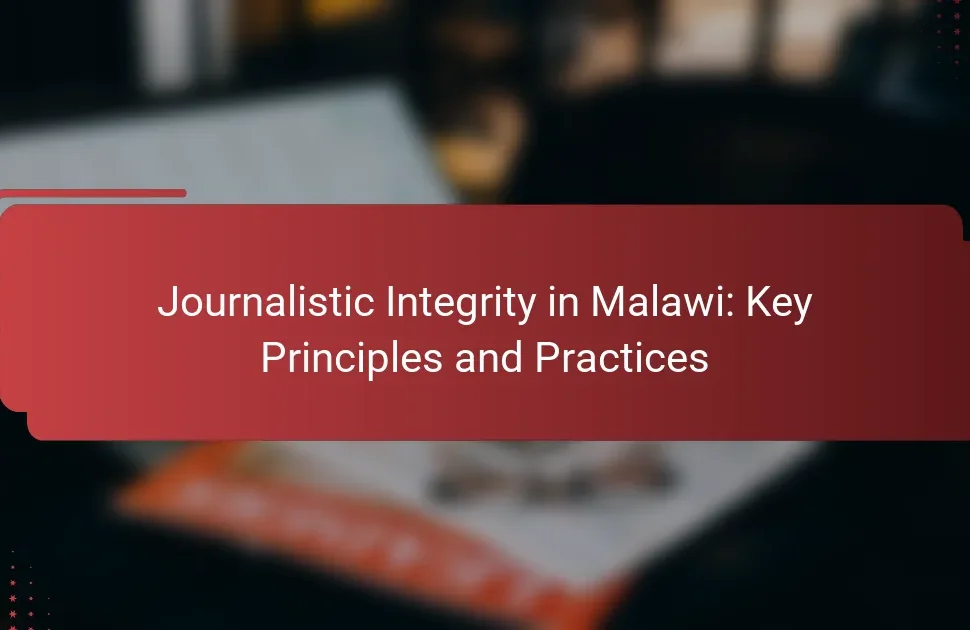Training and development programs for journalists in Malawi are essential initiatives aimed at enhancing the skills and knowledge of media professionals. These programs, offered by organizations such as the Media Institute of Southern Africa (MISA), focus on critical areas including investigative journalism, digital media, and media ethics. By improving reporting quality and ethical standards, these training opportunities address the challenges posed by misinformation and the evolving media landscape. Ultimately, enhanced journalist training contributes to better-informed public discourse in Malawi.

What is Training and Development for Journalists in Malawi?
Training and development for journalists in Malawi involves programs designed to enhance their skills and knowledge. These initiatives aim to improve reporting quality and ethical standards. Various organizations, including the Media Institute of Southern Africa (MISA), offer workshops and seminars. Training covers topics such as investigative journalism, digital media, and media ethics. These programs are essential for adapting to the evolving media landscape. The need for trained journalists is underscored by challenges like misinformation. Enhanced training can lead to better-informed public discourse in Malawi.
How is training structured for journalists in Malawi?
Training for journalists in Malawi is structured through a combination of formal education and on-the-job training. Universities and colleges offer degree programs in journalism and mass communication. These programs cover essential skills such as reporting, editing, and media ethics. Additionally, various media organizations provide internships to give practical experience. Workshops and seminars are also organized by professional bodies to enhance skills. The Malawi Journalists Union plays a key role in advocating for training initiatives. These efforts aim to improve the quality of journalism in the country.
What are the key components of journalist training programs?
Key components of journalist training programs include curriculum design, practical skills training, and ethical journalism education. Curriculum design focuses on foundational knowledge in journalism principles. Practical skills training provides hands-on experience in reporting, writing, and multimedia production. Ethical journalism education emphasizes integrity, accuracy, and accountability in reporting. Additionally, mentorship opportunities and internships are crucial for real-world experience. These components ensure that journalists are well-prepared for the demands of the industry.
How do these components cater to the needs of journalists in Malawi?
The components cater to the needs of journalists in Malawi by providing essential skills and knowledge. Training programs focus on investigative reporting, ethics, and digital journalism. These skills enhance the journalists’ ability to deliver accurate news. Workshops also emphasize practical experience through hands-on activities. Access to resources like online databases supports research and fact-checking. Collaboration with local and international media organizations expands networking opportunities. Continuous development ensures journalists stay updated on industry trends. Tailored content addresses specific challenges faced in the Malawian context.
Why is training and development important for journalists in Malawi?
Training and development are crucial for journalists in Malawi to enhance their skills and adapt to evolving media landscapes. Journalists in Malawi face challenges such as limited resources and the need for accurate reporting. Training programs provide essential skills in investigative journalism, digital media, and ethical reporting. These skills are vital for maintaining journalistic integrity and credibility. Furthermore, development opportunities help journalists navigate legal frameworks and enhance their understanding of human rights issues. Continuous training ensures that journalists can effectively inform the public and contribute to democratic processes. Overall, training and development empower journalists to produce high-quality content and uphold the standards of the profession in Malawi.
What impact does training have on journalistic quality and ethics?
Training significantly enhances journalistic quality and ethics. It equips journalists with essential skills and knowledge. Training programs cover ethical reporting, fact-checking, and investigative techniques. These skills improve the accuracy and reliability of news coverage. Ethical training fosters a commitment to integrity and accountability in journalism. Studies show that trained journalists are more likely to adhere to ethical standards. For instance, a report by the International Journal of Journalism found that trained journalists produce higher-quality content. This leads to increased public trust in media. Overall, training is crucial for maintaining high journalistic standards and ethical practices.
How does professional development influence career progression for journalists?
Professional development significantly influences career progression for journalists by enhancing their skills and knowledge. It provides access to training programs that cover emerging trends and technologies in journalism. Journalists who engage in continuous learning often gain a competitive edge in the job market. Research shows that 70% of employers prioritize candidates with ongoing professional development. Networking opportunities from these programs can lead to job placements and collaborations. Furthermore, professional development fosters adaptability, allowing journalists to navigate changes in the media landscape effectively. Ultimately, these factors contribute to upward mobility and career advancement within the field.
What types of training programs are available for journalists in Malawi?
Journalists in Malawi can access various training programs. These include formal degree programs in journalism offered by universities. Additionally, short courses are available through institutions like the Malawi Institute of Journalism. Workshops and seminars are frequently organized by local and international NGOs. Online training platforms also provide resources for journalists seeking to enhance their skills. Furthermore, mentorship programs connect experienced journalists with novices for practical guidance. These training options aim to improve reporting skills, ethical journalism practices, and media literacy.
What are the major institutions offering training programs?
The major institutions offering training programs for journalists in Malawi include the Malawi Institute of Journalism (MIJ) and the University of Malawi, specifically its Chancellor College. MIJ provides diploma courses in journalism and media studies. The University of Malawi offers degree programs that cover various aspects of journalism and communication. Additionally, the African Institute for Development Policy (AFIDEP) conducts specialized training workshops. These institutions are recognized for their contributions to enhancing journalistic skills and professionalism in Malawi.
How do these programs differ in focus and methodology?
Training programs for journalists in Malawi differ in focus and methodology. Some programs emphasize practical skills, such as reporting and editing. Others prioritize theoretical knowledge, including media ethics and law. Methodologically, certain programs adopt hands-on approaches, involving fieldwork and real-world assignments. In contrast, others utilize classroom-based instruction, focusing on lectures and discussions. For instance, the Malawi Institute of Journalism emphasizes practical training through workshops. Meanwhile, universities may offer more structured curricula with a focus on academic learning. These differences reflect the varied objectives of each program, aiming to equip journalists with diverse skill sets.
What opportunities exist for journalists to enhance their skills?
Journalists in Malawi can enhance their skills through various training programs and workshops. Organizations like the Malawi Journalists Union offer training on investigative reporting and ethics. Additionally, online courses from platforms such as Coursera and edX provide access to global journalism practices. Participating in mentorship programs can also help journalists learn from experienced professionals. Furthermore, attending journalism conferences fosters networking and knowledge sharing. These opportunities support continuous professional development and keep journalists updated on industry trends.
What role do workshops and seminars play in journalist development?
Workshops and seminars are crucial for journalist development. They provide essential training and skills enhancement. These events foster networking opportunities among professionals. Participants gain insights into industry trends and best practices. Workshops often include hands-on activities for practical experience. Seminars feature expert speakers who share valuable knowledge. Research shows that continuous professional development improves reporting quality. In Malawi, such programs are vital for strengthening journalism standards.
How can journalists access online training resources?
Journalists can access online training resources through various platforms. Websites like Coursera and Udemy offer courses specifically for journalism. Many universities provide free online courses via platforms like edX. Professional organizations also create resources, including the International Journalists’ Network. Social media groups and forums often share valuable training links. Additionally, webinars and online workshops are frequently hosted by media organizations. These resources are designed to enhance skills and knowledge in journalism.
How can journalists in Malawi benefit from international training programs?
Journalists in Malawi can benefit from international training programs by gaining advanced skills and knowledge. These programs often cover investigative journalism, digital media, and ethical reporting. Access to global best practices enhances their reporting quality. Training also fosters networking opportunities with international peers. This can lead to collaborative projects and shared resources. Furthermore, exposure to diverse perspectives enriches local journalism. Enhanced skills can improve public trust in media. Ultimately, these benefits contribute to a more informed society in Malawi.
What are the advantages of participating in global journalism initiatives?
Participating in global journalism initiatives enhances collaboration among journalists worldwide. It fosters knowledge sharing and cross-cultural understanding. Journalists gain access to diverse perspectives and best practices. This participation often leads to improved reporting standards. It also provides opportunities for networking with international peers. Furthermore, journalists can secure funding and resources for their projects. Global initiatives often promote press freedom and ethical standards. These advantages contribute to the overall development of journalism in regions like Malawi.
How do international partnerships enhance local training efforts?
International partnerships enhance local training efforts by providing access to global expertise and resources. These collaborations enable knowledge transfer from experienced international trainers to local journalists. They introduce best practices and innovative techniques that improve training quality. Additionally, partnerships often secure funding and materials that local programs may lack. For instance, organizations like the International Federation of Journalists offer workshops and mentorships that elevate local skills. This access to diverse perspectives enriches the learning environment. Ultimately, such partnerships foster a more robust and effective training ecosystem for journalists in Malawi.
What challenges do journalists face in accessing training and development?
Journalists in Malawi face significant challenges in accessing training and development. Limited funding is a primary obstacle, as many media organizations struggle with financial constraints. This lack of resources restricts opportunities for professional development. Additionally, geographical barriers hinder access to training programs, especially in rural areas. Many journalists cannot travel to urban centers where training is typically offered. There is also a lack of tailored training programs that address specific local needs. This results in a mismatch between available training and the skills journalists require. Furthermore, inadequate support from media institutions reduces motivation for journalists to pursue additional training. These factors combined create a challenging environment for journalists seeking to enhance their skills and knowledge.
How do financial constraints affect participation in training programs?
Financial constraints significantly limit participation in training programs. Many potential participants cannot afford tuition fees or associated costs. This financial barrier restricts access to valuable skill development opportunities. A study by the International Journal of Training and Development found that 70% of individuals cited cost as a primary reason for not enrolling in training. Additionally, limited funding often results in fewer available scholarships or grants. Consequently, training programs may see reduced enrollment numbers. This impacts the overall skill level within the journalism field in Malawi.
What barriers exist in terms of geographical access to training?
Geographical access to training for journalists in Malawi is hindered by several barriers. Rural areas often lack training facilities, limiting opportunities for local journalists. Transportation infrastructure is underdeveloped, making travel to training locations difficult. Additionally, economic constraints prevent many journalists from affording travel or accommodation costs. Limited internet access in remote regions restricts online training options. These factors collectively contribute to unequal access to professional development in journalism across the country.
What best practices can enhance training and development for journalists in Malawi?
Best practices to enhance training and development for journalists in Malawi include implementing structured mentorship programs. These programs pair experienced journalists with novices to provide guidance and support. Additionally, offering workshops focused on investigative journalism can improve skills and knowledge. Access to online courses and resources will further enhance learning opportunities. Collaborating with international media organizations can bring expertise and best practices to local training initiatives. Regularly updating training content to reflect current trends is essential for relevance. Encouraging internships with established media houses will provide practical experience. Finally, fostering a culture of ethical journalism is crucial for building credibility in the industry.
How can mentorship programs support emerging journalists?
Mentorship programs can support emerging journalists by providing guidance, networking opportunities, and skill development. These programs connect novice journalists with experienced professionals. Mentors share industry insights and best practices. They help mentees navigate challenges in the journalism landscape. Mentorship fosters confidence and professional growth. Studies show that mentorship increases job satisfaction and retention rates in journalism. For example, the American Press Institute found that mentorship programs improve reporting quality and ethical standards.
What strategies can be implemented to improve training outcomes?
Implementing interactive learning methods can significantly improve training outcomes. These methods engage participants actively, enhancing retention and understanding. For instance, hands-on workshops allow journalists to practice skills in real-time. Incorporating feedback mechanisms also helps identify areas for improvement. Regular assessments can track progress, ensuring that training objectives are met. Utilizing technology, such as online platforms, increases accessibility and flexibility. Research shows that blended learning approaches, combining online and in-person elements, yield better results. According to a study by the International Journal of Training and Development, interactive training boosts knowledge retention by 75%.
Training and development for journalists in Malawi encompasses various programs aimed at enhancing skills, knowledge, and ethical standards within the profession. Key initiatives include formal education, workshops, and mentorship opportunities provided by institutions such as the Malawi Institute of Journalism and the Media Institute of Southern Africa. These programs address essential topics like investigative journalism, digital media, and ethical practices, while also tackling challenges such as misinformation and limited resources. Overall, continuous training is vital for improving journalistic quality and fostering informed public discourse in Malawi.




